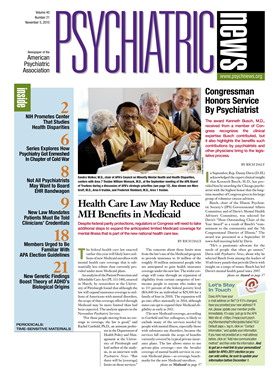The federal health care law enacted earlier this year will likely leave millions of new Medicaid enrollees with mental health care coverage that is substantially less robust than currently provided under most Medicaid plans.
An analysis of the Patient Protection and Affordable Care Act (PL 111-148), enacted in March, by researchers at the University of Pittsburgh found that although the law will expand insurance coverage to millions of Americans with mental disorders, the scope of that coverage offered through Medicaid may be more limited than had been expected. The analysis appears in the November Psychiatric Services.
“For those people moving from no coverage to coverage, the law is good,” said Rachel Garfield, Ph.D., an assistant professor in the Department of Health Policy and Management at the University of Pittsburgh and lead author of the analysis, in an interview with Psychiatric News. “But there will be [coverage] limits on those services.”
The concerns about these limits stem from the law's use of the Medicaid program to provide insurance to 16 million of the roughly 30 million uninsured people who are anticipated to gain health insurance coverage under the new law. The wider coverage will come through an expansion of eligibility from certain categories of low-income people to anyone who makes up to 133 percent of the federal poverty level ($14,400 for an individual or $29,300 for a family of four in 2010). The expansion will go into effect nationally in 2014, although states can opt to expand their Medicaid eligibility as early as 2011.
The new Medicaid coverage, according to Garfield and her colleagues, is likely to exclude many of the services needed by people with mental illness, especially those with substance use disorders, because the services fall outside the scope of benefits currently covered by typical private insurance plans. The law allows states to use private-plan coverage—not the broader coverage of mental health services in current Medicaid plans—as coverage benchmarks for the new Medicaid enrollees.
“If behavioral health benefits are set at those currently available in typical private plans or in benchmark coverage, some newly insured individuals with mental illnesses or substance use disorders who are covered by private plans or Medicaid expansions are still likely to face gaps in covered services,” Garfield and colleagues noted.
Parity Law Doesn't Apply
Mental health advocates had hoped that enactment of the federal insurance parity requirement (PL 110-343) in 2008 would prevent such shortfalls in insurance coverage under the federal health care reform law, but the Medicaid provision appears unable to guarantee broad coverage.
Andrew Sperling, director of federal legislative advocacy for the National Alliance on Mental Illness, told Psychiatric News that his analysis of the law indicates states are more likely to benchmark their Medicaid expansions to more generous state or federal health insurance plans, which would lower the likelihood that substance abuse coverage would be unavailable. More likely, he said, is that traditional Medicaid support services for people with mental illness, such as care coordination and housing supports, will be unavailable to newly covered beneficiaries. “These are the types of services that state Medicaid plans currently pay for,” Sperling said.
The coverage shortfall anticipated by Garfield and her colleagues is allowed by the limits of the federal parity law, which requires insurers who offer mental health coverage to provide equal coverage for mental health services as they do for other types of health care. But there are no general medical service counterparts for several mental health services, Garfield said, including nonhospital residential treatment, partial hospitalization, or treatment by certified addiction counselors.
Federal regulators have yet to determine whether the federal parity law requires private insurance plans to cover mental health services or providers—certain mental health care providers, however, may not qualify for reimbursement regardless of the service they provide since they have no counterpart in other medical or surgical services.
“The final interpretation of the parity provision will be a critical determinant of access to some benefits,” Garfield and her colleagues wrote.
The authors of the health care law said at the time that they were seeking to protect people with mental illness who would want coverage from Medicaid by barring states from adding more eligibility restrictions than now exist. However, the law does not prohibit states from cutting services after reform is implemented, Garfield noted.
And the temptation to cut covered services in Medicaid—already one of the largest line items in state budgets—could mount as states face huge budget shortfalls amid declining tax revenues during the ongoing economic downturn.
Solutions Offered
Fixes to the expected lack of mental health care insurance coverage could come through several avenues, including regulatory changes, Garfield said. Specifically, federal regulations anticipated for release closer to 2014 could clarify whether the essential health benefits package includes services that are important to improving the health of those with mental illness. For example, regulations could require minimum benefits packages in Medicaid that include screening and counseling for substance use disorders.
Another approach would include passing legislation to bar states from restricting Medicaid services beyond current levels and requiring states to maintain their non-Medicaid mental health spending at some proportion of their pre-reform-law funding.
Sperling gives neither of these approaches much chance of success since both would run up against a strengthened Republican role in Congress that likely would block benefits-expansion efforts.
However, another option that may have some chance would encourage states to apply for a 1915i Medicaid waiver that allows them to add expanded services for specific new categories of Medicaid beneficiaries, such as people repeatedly arrested for mental illness–related behaviors.
